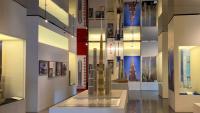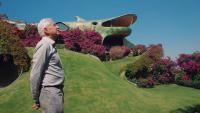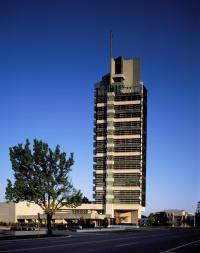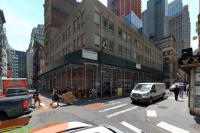Colani-UFO
Lünen, Germany
In the technology centre of Lünen, over a former coal mine factory, hovers a "UFO". Designed in 1985 by Luigi Colani the “UFO” has become a well known Landmark to the area. The technology and foundation centre and the Academy of Applied Science have accommodated the redundant mining shaft building and “UFO” since 2001. In 2007 LÜNTEC GmbH, the owner and operator, initiated a competition to the refurbishment and extension of office space in this complex. The main idea of the competition was to integrate the "UFO", the shaft and the underlying building into a multifunctional complex able to cater for a wide variety of venues. The main requirement was to preserve the industrial charm of the shaft hall through minimal constructive interventions and once achieved now serves as a prelude for the "UFO". The complex will now play host to future exhibitions and events, including conferences and industrial venues. The UFO, once a lost entity held at distance from the centre of engagement now crowns the complex and offers space for a Business lounge. The restored 37m high Landmark allows an imposing 360 ° panorama view to the visitor. The creative atmosphere inside is supported through controlled lighting and high quality textures and materials. Because the technology centre is marked by its contrasting landscape coupled with the existence of the UFO, it was a necessity to incorporate the Shaft Building into the complete ensemble but still define it as an independent. The design of the new building extension forms in comparison to the heterogeneous existing buildings a quiet counter pole. Particularly the earthy black colour or the clear cubistic façade, force the necessary tension needed between existing and contemporary. The dark monolithic facade stands in contrast to the generous, room-high apertures which bring transparency and ease in the building volume. The Integration of all necessary installations in the core of the building generates the impression of clear space with uniform office surfaces and a maximum in flexibility. With the implementation of integral planning it was possible at the design stage to involve all engineers and consultants required to optimise the design process and ensure the successful communication between developer and planner thus satisfying all objectives. A Special Mention on the German facade award and the Titel “Artwork of the year” impressively verifies the innovative integrated design concept of the Building.











